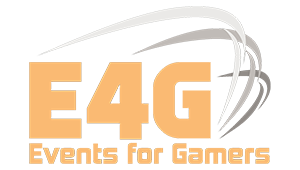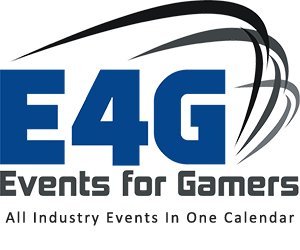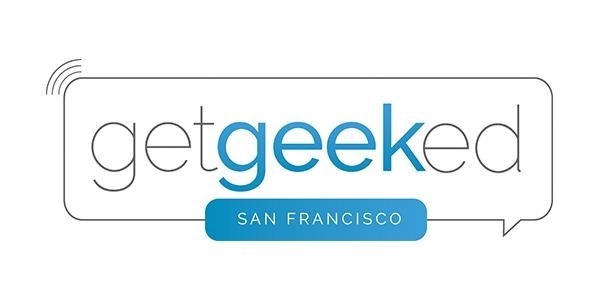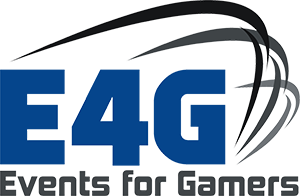Patriot Memory
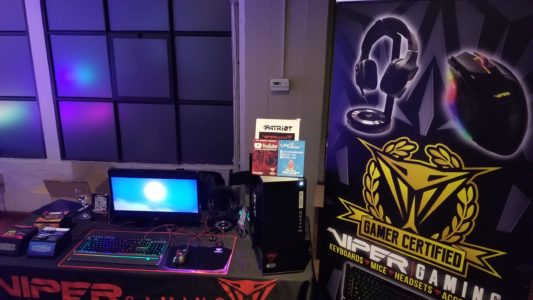
Almost “next door” at the event to Creative Labs was Patriot Memory, a company whose table ran the gamut of gaming accessories and hardware, with a functional gaming layout decked in their Viper line of gear. and a very slick PC rig that showcased their product nicely. That layout included the pretty stuff on the outside of the PC box: a mechanical keyboard, gaming mouse and mouse pad, gaming headset, a USB 3.0 hub. On the guts side, storage was the main draw, covering SSD drives and DDR4 memory.
The V770 Gaming keyboard hits the right basic notes: it features 108 mechanical keys with Kailh Red Switches, offers full RGB lightning, an aluminum chassis, USB and audio pass-through, dedicated multimedia and macro keys. The V770 is listed for $139.99.
The Viper 570 RGB Blackout Edition Mouse (MSRP at $69.99) features a right hand-oriented hybrid FPS and MMO design, and also features that RGB lighting that helps makes game rooms glow in the dark like the Las Vegas Strip. Adjustable weights were available for the custom feel some players look for, while ceramic foot pads made mouse movement smooth and effortless, with the brief time I spent with the mouse. If you want to complete the super lit look, Viper even offers a pricier but flashier full-on LED Gaming Mouse Pad (lists at $59.99), which was also present and accounted for at GetGeeked SF.
Patriot also brought a headset, the Viper V370, too, with the essentials of 7.1 virtual surround sound, foldable mic and RGB illumination. It’s a basic but reasonably solid entry into the PC gaming headset space, especially for an MSRP of $69.99.
Patriot’s other products represented at their product-rich table, the SSDs and DDR4 memory, ironically, which is the silicon-centric company’s mainstay, we hope to take a closer look in the future.
Topology Eyewear
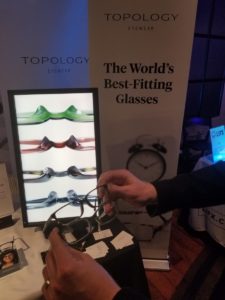
Topology Eyewear is one of those cool companies that might make you proud to be called “four eyes”. But, at first blush, Topology doesn’t seem like a product (or service, really) gamers might be interested in. The San Francisco-based company enables users to snap a short video hemispheric side-to-side clip on an iPhone to create custom eyewear that precisely matches every unique aspect of a face. Using the picture a frame can be selected and the glasses matched to fit. These custom eyeglasses encompass sunglasses, designer glasses or prescription.
However, for streamers, eSports players and game developers — whose eyes are put through their paces every day — the ability to create a custom pair of glasses, whose optics and fit are precise, that sort of precision could matter a lot.
TouchJet
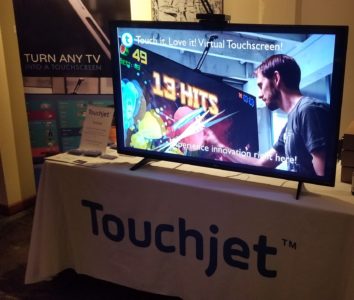
TouchJet presented one of the more interesting product offerings at GetGeeked’s San Francisco showcase. Beginning life as an Indiegogo project in 2015, the TouchJet WAVE aimed to create a virtual touchscreen on displays for Android users. The project met its target and then some. Two years later, the product is featured at a GetGeeked show.
TouchJet is a quad core ARM Cortex A9 processor-powered infrared sensor and style, designed to attach to the top of an HDMI-equipped display, connect wirelessly to your phone and read your gestures on the display. From there, the Android user can interface with the TV with fingertips or stylus, or by phone with the stylus or phone touchscreen. What a user does from there is up to them, but gaming is one of the featured applications for this unique product.
TouchJet representatives demonstrated their product on a big TV screen, with a suite of productivity apps — and notably, a couple game apps, Solitaire and Candy Crush Saga. I tried it out with Google’s touch-driven web drawing app, Quick, Draw!.The TouchJet WAVE was definitely fun to try, but there seemed to be a little lag between input and response on-screen, so it might be a better fit for casual games versus reflex-driven high-speed games or competitive games. Beyond games, the WAVE also has potential for event organizers and speakers, who want more interaction with their presentations beyond a clicker or laser pen.
Western Digital
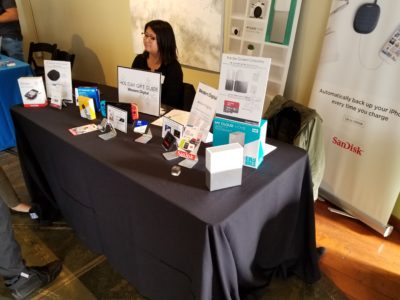
Western Digital and their SanDisk brand were well-represented at GetGeeked’s show, with a range of products for storage, from cloud storage to SD cards. Among the featured products is the (currently) biggest micro SD card, clocking in at a hefty 400 GB. Also, the Sandisk Ultra 3D and Western Digital Black PCIe SSDs, both of which would qualify for the “gaming class” designation. But, what was specifically categorized as gaming product for the event was their console-specific storage options.
For the Nintendo Switch, the $49 64GB or $99 128GB SanDisk Micro SDXC cards options allow gamers to download more digital games and make the whole thing mobile in a tiny form factor. File transfers are said to be certified at 100 MB/s.
Western Digital offers “My Passport” storage for the PlayStation 4, which expands on the storage in Sony’s flagship console, either for 2TB ($95) or 4TB ($129.99).
Conclusion
GetGeeked SF was definitely smaller in 2017 than last year, covering one floor of its venue rather than two, as it was in 2016. Some attendees seem to have been disappointed by the overall rollback in size. However, the concentration of products and services of direct (or potential) interest to gamers felt proportionally greater. The event has maintained its accessibility to press and tech-savvy consumers — and fresh products, companies and ideas to connect with, overall.
Events for Gamers will take a closer look at some of the products mentioned here as we have the opportunity to. Stay plugged in, East Coast, for the next round of GetGeeked events in 2018.
